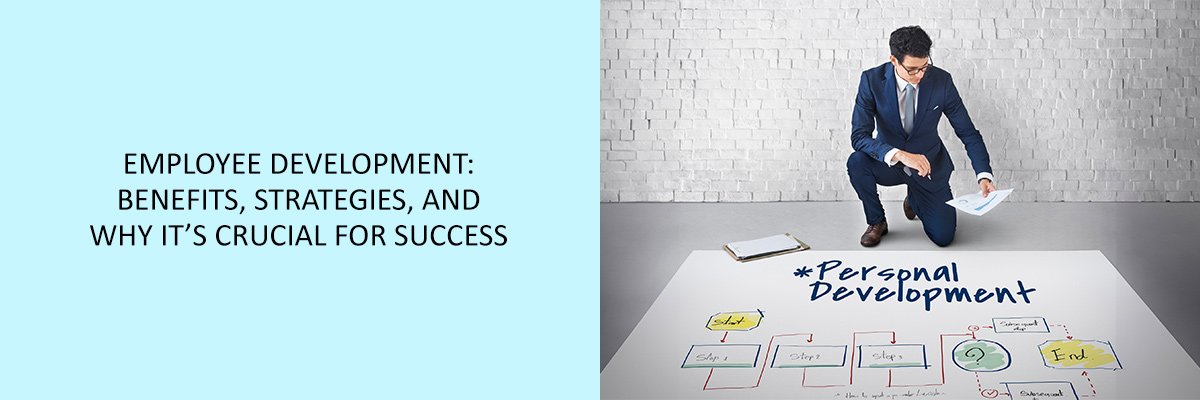Employee development is one of the most critical investments a company can make. It’s not just about teaching employees new skills; it’s about fostering their personal and professional growth to create a capable, motivated, and engaged workforce. By focusing on their development, organizations can drive innovation, enhance productivity, and ensure long-term success.



If you are an employer or an HR professional, this blog provides valuable insights on effectively managing your human resources. If you want to explore more on similar topics, feel free to check out our other free blogs on HR and related subjects. Additionally, we offer hundreds of HR webinars where you can enroll to learn directly from industry experts and earn SHRM and HRCI credits to boost your career. Do check out our Human Resource webinar page.
Why Employee Development is Important
Employee development plays a vital role in both individual and organizational success. When employees are given opportunities to grow, they become more skilled, confident, and motivated. This improves their performance and job satisfaction while making them better equipped to handle challenges, adapt to change, and drive innovation.
Investing in development also fosters a culture of learning and growth where employees feel valued and supported. This boosts morale, reduces turnover, and encourages loyalty. Ultimately, employee development benefits everyone involved, it empowers individuals to achieve their career goals while helping organizations reach their objectives.
Meeting Basic Physical Needs
To thrive, employees first need their fundamental physical needs met. These include financial security, health, rest, and a stress-free routine. When these needs are fulfilled, employees gain the mental clarity and energy required to focus on their work and grow professionally.
Here are the key areas companies should prioritize:
- Fair Compensation
Financial stability is a basic necessity. A good salary enables employees to afford essentials like housing, food, healthcare, and transportation. When employees feel financially secure, they can concentrate on their work without the burden of financial stress.
- Perks and Benefits
Benefits like health insurance ensure employees can maintain their physical and mental health, while retirement plans provide long-term financial stability. These perks show that the company cares about their well-being, reducing stress and enhancing loyalty.
- Work-Life Balance
Adequate rest is essential for maintaining physical and mental health. Flexible work hours, sufficient vacation time, and remote work options allow employees to recharge and prevent burnout. A balanced lifestyle makes employees more productive, motivated, and satisfied.
- Comfortable Commute
A lengthy, stressful commute can drain energy and lower morale. Companies can alleviate this by offering transportation benefits, remote work options, or conveniently located offices. Employees who arrive at work feeling refreshed are better prepared to perform their duties effectively.
When basic needs are met, employees can channel their focus and energy toward developing their skills, advancing their careers, and contributing to the organization’s success.
The Consequences of Ignoring Basic Needs
If these needs are not addressed, employees may struggle to concentrate on improving their skills or achieving their career goals. This can lead to poor performance, which negatively impacts the organization and hinders the employee’s growth. Without development opportunities, employees risk stagnation, both personally and professionally.
Fulfilling Career Development Needs
Once basic needs are addressed, organizations should focus on meeting employees’ career development needs. Here are effective strategies for doing so:
- Provide Tools and Resources
Equip employees with the necessary tools and resources, such as up-to-date technology, software, and training materials, to help them perform their roles efficiently.
- Offer Training and Workshops
Regular training programs and workshops enable employees to stay current with industry trends, develop new skills, and remain competitive. Continuous learning enhances confidence and job performance.
- Acknowledge and Reward Achievements
Recognizing employees for their accomplishments boosts morale and motivation. Whether through bonuses, salary increments, promotions, or public acknowledgment, rewards demonstrate appreciation for their contributions.
- Provide Career Guidance and Support
Mentorship programs and career counseling help employees set and achieve professional goals. A clear growth path within the organization keeps employees motivated and engaged.
- Foster a Positive Work Environment
A supportive and inclusive workplace culture ensures employees feel respected and valued. Open communication, regular feedback, and team-building activities strengthen relationships and improve job satisfaction.
- Encourage Creativity and Innovation
Giving employees the freedom to share ideas and take ownership of projects fosters a sense of trust and empowerment. This not only improves job satisfaction but also leads to innovative solutions that benefit the company.
Why Employee Development Leads to Company Success
When employees feel valued, supported, and given opportunities to grow, their productivity, creativity, and loyalty increase. A well-trained workforce is more resilient, adaptable, and innovative, which gives the organization a competitive edge.
Employee development also reduces turnover, as employees are more likely to stay with a company that invests in their growth. This saves costs associated with hiring and training new staff while strengthening the organization’s overall culture and performance.
In today’s fast-paced business environment, employee development is no longer optional, it’s a necessity for creating a sustainable and thriving organization.


